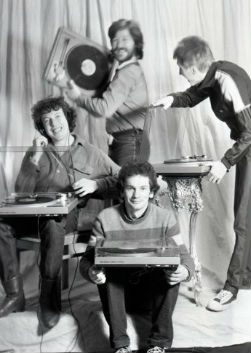Foundation date: 1969
The country: Russia
Town: Moscow
Compound:
Andrey Makarevich (vocals)
Links:
Photo: Time Machine
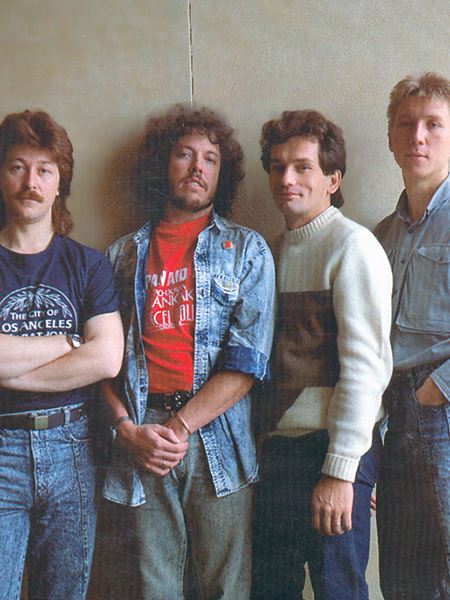
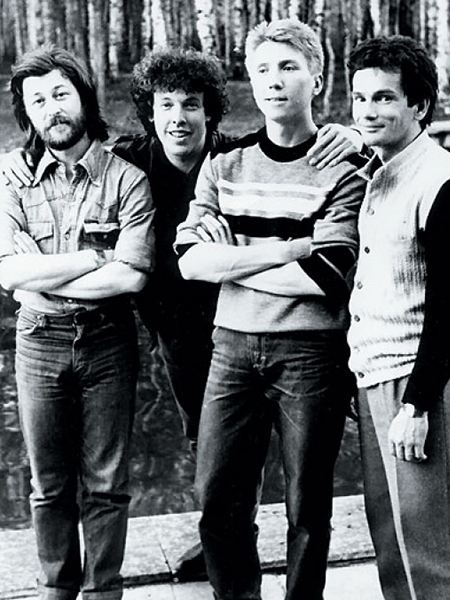
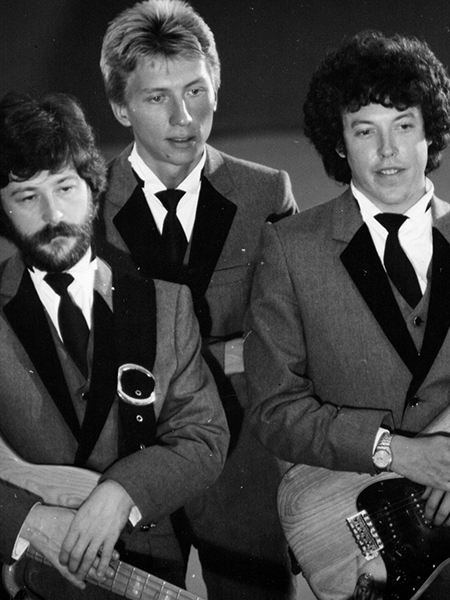
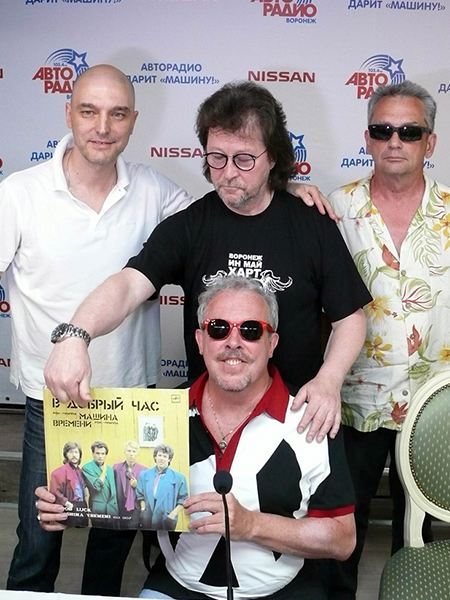
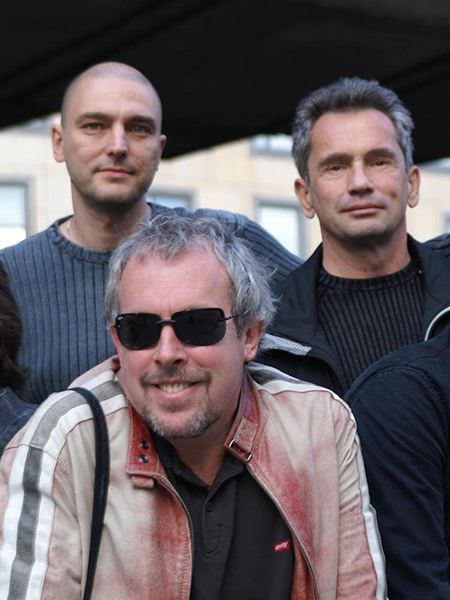
+12 photos
Biography of the Time Machine group
The Time Machine team is rightfully considered the founder of classical Russian rock and has made an invaluable contribution to the national musical culture. The Machinists were not only the first to compose and perform rock music in Russian (1969 is considered the official birth date of the group), but also filled it with deep meaning, thereby making the audience think about important universal problems. For half a century, the work of “Time Machine” has not lost its relevance and is a kind of standard of musical style and professionalism for both millions of fans and numerous colleagues in the shop.
Group “Time Machine”
History of the group
Moscow schoolboy Andrei Makarevich became interested in music as a teenager and already at the age of fifteen he organized his first band, The Kids, which, in addition to him, included Misha Yashin, Larisa Kashperko and Nina Baranova. At first, the guys sang in English, performing with hits by popular Western performers at amateur performances and school discos.
The Kids (1968)
In 1968, Andrei first heard the Beatles, whose work completely turned his mind around. An example of the Liverpool Four, as well as a joint performance at a school concert with VIA Atlanty, inspired young Makarevich to create the Time Machines rock band. In it, by analogy with the Beatles, there was no longer a place for girls: Andrey sang and played the guitar, Pasha Rubin and Igor Mazaev became bass players, Yura Borzov sat down at the drums, Sasha Ivanov played rhythm guitar, the keys were entrusted Seryozha Kawagoe. The latter’s parents worked at the embassy, lived and worked in Japan for a long time and acquired high-quality musical equipment, which qualitatively improved the sound of the newly formed group.
“Time Machine”. Start
At first, there were often disagreements among the band members about the musical material: Makarevich insisted on the original repertoire, the rest of the guys tried to imitate the Beatles. Because of this, there was even a split in the group, and Mazaev, Borzov and Kawagoe made an attempt to create their own team, which was unsuccessful. Time Machines reunited again, and soon the first album, consisting of eleven English-language songs, was recorded on a home tape recorder. Unfortunately, this material has not been preserved, which Makarevich does not regret at all, calling it “monstrous”.
At the beginning of the creative path, “Time Machine” was called “Time Machines”
By this time, the guys had finished school and were thinking about continuing their education. Not everyone managed to combine their studies at the university with music, and Rubin and Ivanov left the group. Makarevich and Borzov entered the Moscow Institute of Architecture, where they met Alexei Romanov and Alexander Kutikov. The guys began to perform together in the institute rock group, gave concerts in the Energetik Palace of Culture.
In the photo: Yuri Borzov and Sergey Kavgoe
Soon Kutikov replaced Mazaev, who had gone into the army, and Maxim Kapitanovsky took the place of the drummer. A year later, he also went to serve in the Armed Forces, and Kawagoe himself sat down at the drums.
The main stages of creativity
Until the mid-70s, this trinity remained the main line-up of the group, which by that time had already changed its name to “Time Machine” and, thanks to the participation in the recording of the Zodiac trio’s record, even appeared at the Melodiya studio.
At first, the musicians tried to be like The Beatles
But the Rosconcert and the Union of Composers ignored the appearance of a strange group that stood out from the general concept of the Soviet stage, and put all sorts of obstacles in the way of young musicians. In the group itself, too, everything was not going smoothly, and in 1974, due to disagreements with Kawagoe, Kutikov left it. He was replaced by Evgeny Margulis, a universal musician with a “blues” voice.
In the same year, the “machinists” were invited to star in Georgy Daneliya’s film “Afonya”, and although the episode with their participation was cut out in the final version, the song “You or Me” remained in the film, and the name of the group was in the credits.
Tour in Tallinn (1976)
In 1975, the “Time Machine” was called to television to record the “Music Kiosk” program. The program was never aired, but seven new compositions recorded in a professional studio quickly spread throughout the country. When in 1976 the group was invited to perform at the music festival in Tallinn, their songs were already well known to the public, which warmly welcomed the “Time Machine”. The team won the main prize and met many talented musicians, including Boris Grebenshchikov. He helped organize the tour of the “machinists” in St. Petersburg, which were a huge success.
But, nevertheless, officials “from culture” continued to persistently ignore their increased popularity, so the group’s touring activities took place in an “underground mode”. Makarevich was unnerved by this situation, and he tried in every possible way to give the team an official status. Andrey even came up with the literary and musical program “The Little Prince”, with which he unsuccessfully tried to get into the “Rosconcert” for several years.
The rest of the band members were quite satisfied with their “illegal” position, which did not affect the income from touring in any way, so disagreements began again among the musicians. In 1979, Kavagoe and Margulis moved to “Sunday”, Kutikov returned to the group, and after a while Pyotr Podgoretsky joined the team.
Pyotr Podgoretsky and Andrey Makarevich in their youth
In the same year, “Time Machine” got the opportunity to perform from the “Rosconcert”, entering the troupe of the Moscow Comedy Theater. The musicians immediately started creating a new concert program, and a few months later they loudly declared themselves at a prestigious music festival in Tbilisi. From this moment begins the rapid rise of the group to the top of the musical Olympus.
Their hits were played on radio stations, cassettes filled the recording kiosks, and after participating in the film “Soul”, the band members began to be stopped on the streets. But, despite this, in 1982, the work of the “Time Machine” was sharply criticized by officials (“… a rock group declares indifference and hopelessness from the stage and multiplies the records of these dubious declarations,” party critics wrote), and only a wave of people’s anger and thousands of letters from fans forced the functionaries to retreat.
This dual situation persisted until the mid-1980s. The group actively toured the country and freely performed songs of their own composition. At the same time, she was banned from official performances in Moscow, most of the television programs with the participation of musicians fell on the shelf, and until 1986 not a single professional studio album was released.
Participants of the “Time Machine” in his youth (1986)
With the beginning of Perestroika, the situation changed radically. The team became a participant in the Festival of Youth and Students and for the first time went on tour abroad. The excitement at their concerts was comparable to the height of the “Beatlemania”, when the fans were ready to break their idols from the excess of feelings. At the end of 1986, the group’s first official album “Good Hour” (a compilation of the best songs) was released, and a year later – the first studio album “Rivers and Bridges”. The musicians became frequent guests on television, not a single popular music and entertainment program at that time could do without their presence.
The heyday of the group’s popularity came in the era of Perestroika
The Time Machine celebrated its twentieth anniversary with a large-scale combined concert in Luzhniki, at which close musician friends and former members of the band performed. The next quarter-century anniversary was celebrated by the machinists in the very heart of the capital, on Red Square. The concert was attended by the best Russian rock bands, and about 350 thousand people gathered to listen to the musicians.
“Time Machine” on tour in the USA
After 1991, Makarevich began to actively participate in the public life of the country, openly demonstrating his civic position. The group came out in support of Boris Yeltsin at the barricades of the White House, and in 1996 supported Boris Nikolaevich in the next presidential election.
Many politicians were present at the anniversary concert at the Olimpiysky, dedicated to the band’s thirtieth anniversary. Among them were Anatoly Chubais, Boris Nemtsov and Vladimir Putin, then still in office as prime minister. Immediately after this large-scale show, Pyotr Podgorodetsky was fired due to excessive addiction to cocaine. Later, he wrote the controversial book “The Machine with the Jews”, in which he spoke not in the best way about his former bandmates.
The last concert in which Podgoretsky took part was a performance in 1999, dedicated to the 30th anniversary of the group. In 2000, a live DVD was released, recorded at this performance. The musicians performed 36 of their hits.
In the zero years, the group consistently delighted fans with new creativity. In 2001, the experimental album “A Place Where There Is Light” went on sale, in which keyboardist and arranger Andrey Derzhavin, who replaced Podgoretsky, made his debut. He also wrote the lyrics for the song “Wings and Sky”, however, he later admitted that it turned out rather weakly. In general, the album turned out to be unusual for the group’s work: the listeners were waiting for a completely new sound quality and a large number of soloists.
Andrey Derzhavin became the band’s new keyboardist
The jubilee, tenth studio album “Time Machine” called “Machinically” (it was invented by 26-year-old Elina Sokolova, who won the title contest announced by the group) was released in 2004.
This is the first studio album to feature the band’s logo on the cover.
The next album, Time Machine, was recorded at Abbey Road Studios in London. The studio staff wanted to send the resulting material to the organizers of the Grammy Award (in the Foreign Music nomination), but this required huge investments from the group itself, and it was impossible to earn several hundred thousand dollars selling discs in Russia.
Time Machine at Abbey Road Studios
The next album, Do Not Park Cars (2009), in addition to the group’s new songs, unexpectedly included covers by other performers of the old hits of Time Machine. Sergei Chigrakov from “Chizh” sang “Crossroads”, Alexey Kortnev sang “What did you have”, Boris Grebenshchikov – “I am a snake” and “Apocrypha”, Pyotr Mamonov – “Leisure Boogie”, etc.
Discography
- Rivers and Bridges (1987)
- In the circle of light (1988)
- Slow Good Music (1991)
- It’s been so long…1978 (1992)
- Freelance commander of the Earth. El Mocambo Blues (1993)
- Cardboard Love Wings (1996)
- Breaking Off (1997)
- Clocks and Signs (1999)
- The place where the light is (2001)
- Mechanically (2004)
- Time Machine (2007)
- Cars do not park (2009)
- YOU (2016)
The Time Machine group now
Recently, “Time Machine” has drastically reduced the number of performances and does not often indulge its fans with concerts. Perhaps this is due to the departure of Margulis from the group and the political statements of the leader of the group, which disappointed many fans of the band. So, in 2014, the anti-militarist Makarevich condemned the annexation of Crimea to Russia, repeatedly participated in anti-government rallies of white-ribbon democrats, and spoke to Ukrainian military personnel in Slavyansk. The discrepancy in political views also explains the sudden departure from the group of Andrei Derzhavin, who was banned by the Ukrainian authorities from entering the country before a tour in the fall of 2017.
As for creativity, the last album of the group – “You” – was released in 2016. A new member of the group, guitarist Igor Khomich, took part in the recording of the album.
“Time Machine” is still in service
Time Machine – listen online
More news Time Machine

